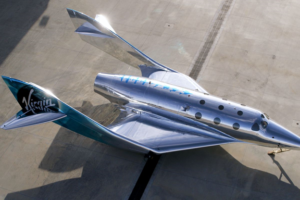
Almost all investors have mistakenly held onto a stock, hoping it’ll bounce back, only to watch it plummet further. Regardless, they still often bounce back in the long run if you go after profitable companies. It doesn’t matter what valuation you buy profitable and quality businesses, as they will reward you in the long run.
However, not all stocks have the same underlying business. Some stocks are perpetually diluting their shareholders and do not have any profits. Instead, these businesses are likely to keep bleeding cash until they file for bankruptcy. They’ll look cheap on the surface, but you should steer as far as possible from these stocks. If not, you’ll likely enter a cycle of reverse stock splits and dilution.
Here are seven stocks to sell to avoid that pitfall:
Virgin Galactic (SPCE)

Virgin Galactic (NYSE:SPCE) operates commercial spacecraft designed to fly private astronauts and researchers to space. The company’s inability to turn a profit and history of overpromising and underdelivering have me seriously concerned about its long-term viability.
Management touted increasing the flight frequency of their mothership, VMS Eve, to support three space missions per week. They project this could generate $450 million in annualized revenue with their first two Delta spaceships. However, I struggle to see the market demand to fill 770 seats per year at $600,000 or more a ticket. Space tourism remains a very niche market with a limited pool of ultra-wealthy clientele.
Meanwhile, deep-pocketed competitors like Blue Origin and SpaceX are rapidly advancing their own space tourism capabilities. This rivalry threatens to siphon away Virgin Galactic’s already small addressable market. The company also continues battling regulator scrutiny and technical delays that have decimated investor confidence. The stock is down 83% year-to-date.
Virgin Galactic feels like a company far too ahead of its time. It is burning cash on an exceedingly expensive business model with dubious consumer demand. I don’t think it can reach profitability before the coffers run dry.
Beyond Meat (BYND)

Beyond Meat (NASDAQ:BYND) is a plant-based meat substitute company that has been struggling to find its footing in an increasingly competitive market. In my opinion, the company’s Q1 2024 earnings paint a bleak picture for the future of Beyond Meat.
Despite reporting revenue of $75.6 million, which narrowly beat expectations, the company’s gross margin of 4.9% is a far cry from the 6.7% it reported in Q1 2023. This decline in profitability is particularly concerning given the company’s ongoing efforts to bring production in-house and consolidate its network. I’m not sure how a company can turn profitable with margins like this.
Beyond Meat’s operating expenses at $57.1 million includes a $7.5 million accrual for consumer class action settlements. While the company has managed to reduce its operating expenses by $6.8 million year-over-year, it’s clear that Beyond Meat is still struggling to control costs.
As a result, Beyond Meat reported a staggering loss from operations of $53.5 million in Q1 2024, only a slight improvement from the $57.7 million loss it reported in the same period last year. This ongoing bleeding of cash is unsustainable.
iHeartMedia (IHRT)

iHeartMedia (NASDAQ:IHRT) is a media and entertainment company. If trends don’t improve dramatically, it could be headed for bankruptcy.
iHeart missed revenue guidance, posting a concerning 1.5% decline to $799 million in Q1. Profitability remains elusive, with analysts projecting another year of losses.
None of this is instilling any confidence on Wall Street. Guggenheim slashed their price target by 40%, and the stock has plummeted 74% over the past year to trade near all-time lows. The technicals scream oversold, too, but in this case, I think it’s deserved pessimism rather than an attractive discount. iHeart’s core radio broadcasting model is in secular decline as advertising dollars shift to streaming, so I’m not very hopeful about a rebound here.
Exela Technologies (XELA)

Exela Technologies (NASDAQ:XELA) provides business process automation solutions. In Q1 2024, Exela’s revenue declined by 5.4% YOY to $258.8 million. The core Information and Transaction Processing Solutions segment was hit particularly hard, with revenue plunging 9% due to the loss of a substantial $27 million contract.
What’s even more alarming is that Exela is struggling to turn a profit despite operating in the high-growth, high-margin business process automation space. The company reported a net loss of $25.6 million for the quarter. Liquidity also appears to be a major issue, with unrestricted cash dwindling to a mere $10 million after making an interest payment. Management even admitted they are scrambling to “expand liquidity” as rising taxes erode their dwindling net operating losses.
The fact that Exela is flailing in such a lucrative industry is a giant red flag. With the stock already down 51% over the past year, I believe this downward spiral is far from over.
ChargePoint (CHPT)

ChargePoint (NYSE:CHPT) has an extensive EV charging network. Revenue declined 17.7% YOY to a paltry $107 million.
What’s going on here? The company blamed deal delays on construction setbacks, but I suspect there are deeper issues at play. ChargePoint’s inventory spiked 13% as they grapple with sluggish demand in a fiercely competitive market. Rivals are chomping at the bit, and even the company admits Tesla (NASDAQ:TSLA) opening its Supercharger network is a looming threat.
Cash burn remains alarming, and profitability is a distant dream. The CEO also jumped ship. Some argue ChargePoint expanded too quickly to dominate this space. I’d agree with that since margins are not going to turn positive unless the company sacrifices its top line.
I’m steering clear of this stock, especially as dilution is accelerating.
With shares down almost 80% in the past year alone, I see no compelling reason to bottom-fish here.
Redfin Corporation (RDFN)

Redfin Corporation (NASDAQ:RDFN) is a real estate brokerage company that operates an online real estate marketplace. Despite their best efforts, I believe Redfin is facing an uphill battle that could push them towards financial ruin. In the first quarter of 2024, the company reported a substantial adjusted EBITDA loss of $28 million. While this was slightly better than their guidance, it’s still a concerning sign of their ongoing struggles.
What’s more troubling is that this loss comes after Redfin has already implemented significant cost-cutting measures. They’ve restructured their brokerage in an attempt to gain market share, but even with a slight uptick to 0.77% in Q1 2024, it’s unclear if this will be enough to right the ship. The harsh reality is that rising mortgage rates are putting immense pressure on Redfin’s business model.
In my view, their goal of achieving a full-year adjusted EBITDA profit seems increasingly out of reach. The housing market is on shaky ground, and Redfin’s previous $23 million net loss in Q4 2023 doesn’t inspire confidence. While the company is touting the growth potential of its rental marketplace and lending business, I fear these initiatives will be too little, too late.
Terran Orbital (LLAP)

Terran Orbital (NYSE:LLAP) manufactures small satellites for commercial and government customers. The company has faced significant challenges recently, and I believe its stock is a strong sell candidate before its situation potentially deteriorates further.
In Q1, they finally held an earnings call after not doing so in Q4. Terran Orbital’s revenue declined 3.4% YOY to just $27.2 million, substantially missing analyst estimates by over $14 million. The company’s net loss of 27 cents per share was also much worse than the consensus forecast.
Moreover, there has been slow progress on Terran’s $2.4 billion Rivada Space Networks contract.
Rich Smith from The Motley Fool called it “a tale of two stocks.” He also pointed out that “… Rivada is an alleged space company that no one seems to have heard of, and that according to data from S&P Global Market Intelligence, may have annual revenues of less than $5 million… but is somehow promising to pay Terran Orbital $2.4 billion to build it 300 satellites.”
Any delays or issues with this Rivada project could be devastating. This is the only thing keeping bulls optimistic right now.
Terran Orbital’s cash burn remains elevated, and I question whether its modest workforce expansion and automation investments will be enough to significantly improve efficiency. With just under 50 satellites slated for delivery in 2024, production will need to ramp up dramatically to meet targets.
Furthermore, Lockheed recently abandoned its acquisition offer amid Terran’s ongoing strategic review. Stockholders equity is also negative.
I believe the risks far outweigh any potential rewards right now.
On the date of publication, Omor Ibne Ehsan did not hold (either directly or indirectly) any positions in the securities mentioned in this article. The opinions expressed in this article are those of the writer, subject to the InvestorPlace.com Publishing Guidelines.
On the date of publication, the responsible editor did not have (either directly or
indirectly) any positions in the securities mentioned in this article.




